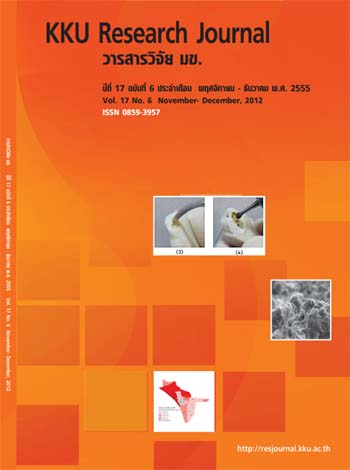Cloning and expression of xylitol dehydrogenase gene from Candida shehatae in Saccharomyces cerevisiae
Main Article Content
Abstract
The inability of Saccharomyces cerevisiae to utilize xylose is attributed to its inability to convert
xylose to xylulose. Low xylose reductase and xylitol dehydrogenase activities in S. cerevisiae are regarded as the
reason of blocking the pathway from xylose to xylulose. In previous study, we cloned and expressed the xylose
reductase gene from Candida shehatae in S. cerevisiae which enables it to grow in xylose-containing medium. In
this study, we investigated the activity of xylitol dehydrogenase gene of C. shehatae in S. cerevisiae. The xylitol
dehydrogenase gene (XYL2) from C. shehatae was amplified by polymerase chain reaction (PCR). It was placed
into plasmid pSFAU to produce the recombinant expression vector pSFAU-XDH. Subsequently, the pSFAU-XDH
vector was transformed into S. cerevisiae TISTR5339 to produce a recombinant S. cerevisiae TISTR5339-XDH.
The recombinant S. cerevisiae showed higher growth rate than the untransformed strain in media containing xylitol
as a carbon source. The specific enzyme activity of xylitol dehydrogenase in the recombinant S. cerevisiae was
determined. The highest specific activity was 0.805 mU mg-1 protein or 0.013 nkat mg-1. This work demonstrates
the functionality of the gene xylitol dehydrogenase from C. shehatae in S. cerevisiae.


